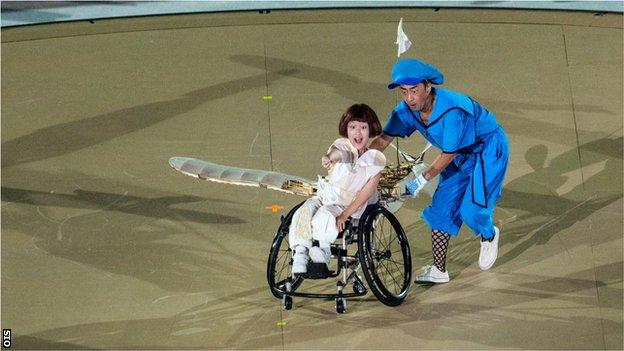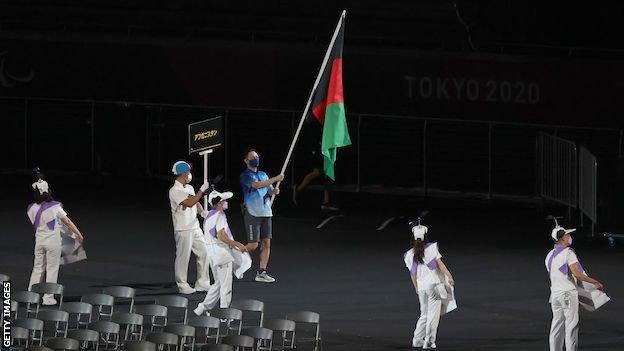Tokyo Paralympics: 2020 Games get under way with powerful opening ceremony
“Paralympic athletes know that no matter which way the wind blows, its power can be harnessed to move forward. They know that by being brave and spreading their wings, they can reach extraordinary heights.”
The words of Tokyo 2020 organisers, as the Paralympic Games finally opened, 364 days later than planned and after a year of the utmost difficulties.
Five years have passed since competitors said ‘tchau’ to Rio. At long last, it is the turn of the Paralympics to bid ‘konnichi wa’ to Tokyo.
The Games began with an opening ceremony full of colour and celebration interjected with a touch of poignancy, a concept of ‘We Have Wings’ which organisers said was intended to raise awareness of the courage of Paralympians.
“I cannot believe we are finally here,” said Andrew Parsons, president of the International Paralympic Committee, in his opening speech.
“Many doubted this day would happen. Many thought it impossible. But thanks to the efforts of many, the most transformative sport event on earth is about to begin.”
These Games will feel different to those of previous times. But as the Olympics showed just a few weeks ago, the power of sport will prevail.
It has the power to create “winds of change” too.
Most of us haven’t been through an airport in nearly 18 months, but Tuesday’s opening ceremony – at Tokyo’s National Stadium – transported us to Para Airport.
There we met the Little One-Winged Plane, convinced she cannot fly because she has only one wing. Gradually, she has a change of heart, inspired by the displays of resilience around her, and grows enough in confidence to take off on her own journey.

No crowds were there to watch the opening ceremony, as will be the case throughout the Games, but it was a still a show, a cauldron of colour and celebration.
There were sombre moments, too, reflective of the events of the past 17 months. A rescue worker was among those to carry the Japanese flag into the stadium, while the Paralympic flag was handed over to eight key workers who supported the people of Japan in their day-to-day lives during the Covid-19 pandemic.
Of the 714 cast members performing in the opening ceremony, 166 have impairments. In Japan, it is hoped the Games will act as a catalyst for change in societal attitudes towards disability in the country.
The parade of athletes saw swimmer Ellie Simmonds and archer John Stubbs carry the flag for Great Britain, leading a 17-strong British delegation into the stadium.
Eight-time Paralympic medallist Simmonds later called it “one of the proudest moments” of her life.
The Afghanistan flag was carried in by a Games volunteer, as an act of solidarity after Afghanistan’s two Paralympic athletes were forced to withdraw from the Games because of the situation in the country since the collapse of the government and the return of the Taliban.

The Paralympic cauldron, placed lower than its Olympic counterpart so competitors can “feel an affinity” with it, opened like a flower to “embody vitality and hope”, and was lit by a trio of Japanese Para-athletes.
In all, about 4,400 athletes from 162 national Paralympic committees will compete in 539 medal events across 22 sports in Tokyo, the first city to hold the summer Paralympics twice, having first done so in 1964.
“Paralympians, you gave your all to be here. Blood, sweat and tears. Now is your moment to show the world your skill, your strength, your determination,” said Parsons.
“If the world has ever labelled you, now is your time to be relabelled: champion, hero, friend, colleague, role model, or just human. You are the best of humanity and the only ones who can decide who and what you are.
“You are the truth. You are amazing. You choose to be the greatest in whatever the plan is.
“Your performances could change the fortunes of your lives. But most importantly they will change the lives of 1.2 billion forever. This is the power of sport, to transform lives and communities. Change starts with sport. And from tomorrow on, Paralympic athletes start once again to change the world.”
Great Britain won 147 medals, including 64 golds, in Rio. Time to find out what Tokyo’s got.



